This was the EuroVelo General Meeting 2025
The EuroVelo General Meeting 2025 took place in Balatonfüred, Hungary, on 24 September, just before the EuroVelo & Cycling Tourism Conference. The annual meeting of National EuroVelo Coordination Centres, as usual, was held in a hybrid form, allowing delegates and observers to join wherever they were, and was supported by Active Hungary.
This year, the EuroVelo General Meeting (EVGM) gathered 53 people in person and 12 online, proving again its growth over the years. Representatives of five observer countries (Albania, Bulgaria, Latvia, Romania and Sweden) showed the ever-present interest in establishing better EuroVelo coordination in countries without a National EuroVelo Coordination Centre just yet.
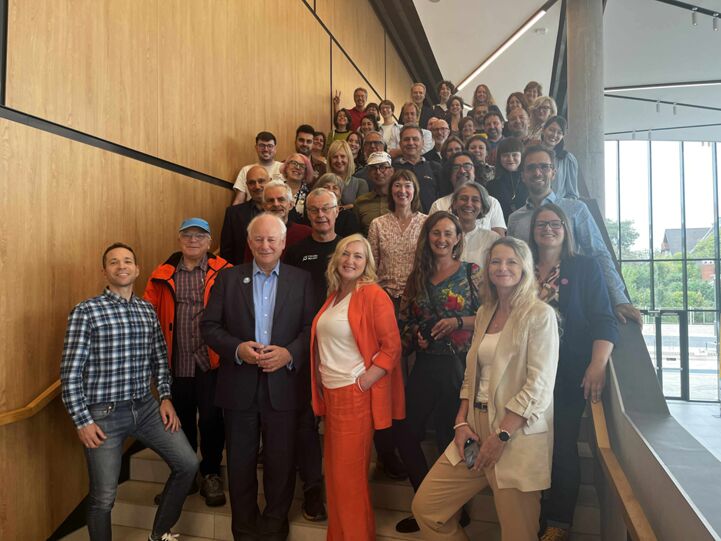
The EVGM is the cornerstone of EuroVelo governance, considering the role that voting National EuroVelo Coordination Centres have in acknowledging and approving work plans, deciding on matters such as the strategy review, and appointing new EuroVelo Council members and voting on the admission of aspiring NECCs to the network. This year, delegates from 21 countries could cast their vote.
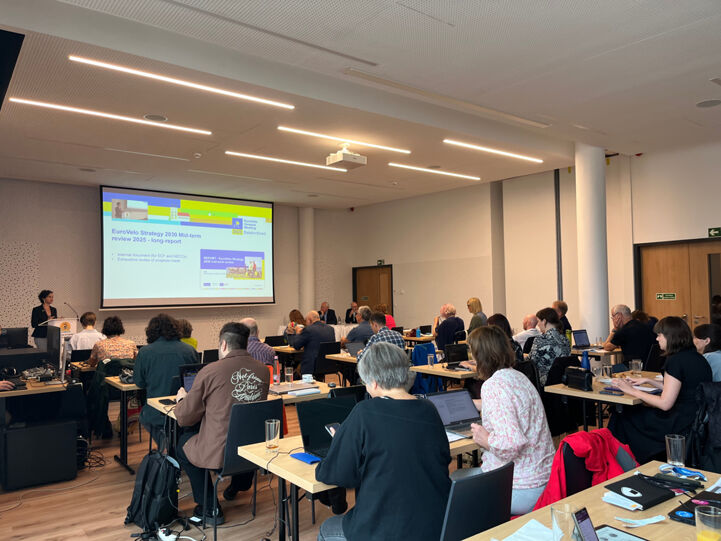
The first part of the EuroVelo General Meeting saw the procedural part being completed: the Annual Report, Budget and Work Plan were acknowledged under the guidance of ECF President Henk Swarttouw and EuroVelo Council Chairperson Jesper Pørksen, who chaired the meeting. Documents such as the Annual Report reflect the work of and are prepared by the EuroVelo Management Team, and form part of the broader ECF Annual Report.
The mid-term review of the EuroVelo 2030 strategy was approved, too, providing an assessment of the past five years and a look towards the next five years.
The short version of the strategy review is now publicly available on the Resources section of the EuroVelo for Professionals website.
Liechtenstein and Poland join the NECC network
It was then the turn of the applications to establish new National EuroVelo Coordination Centres in countries without one. The call for NECCs is always open, with yearly deadlines to submit an application to the EuroVelo Management Team at the end of June. This year, we welcomed applications from Liechtenstein and Poland.
Alice Bögli of SwitzerlandMobility, the current Swiss NECC, presented their application for SwitzerlandMobility to coordinate EuroVelo in the Principality of Liechtenstein. The small state was recently included in the EuroVelo network with the extension of EuroVelo 15 – Rhine Cycle Route. Liechtenstein cycle routes have been fully integrated in the SwitzerlandMobility database and system for many years; the Foundation is therefore the best-placed candidate to coordinate the EuroVelo route in the Principality, too, also considering the request from the local authorities.
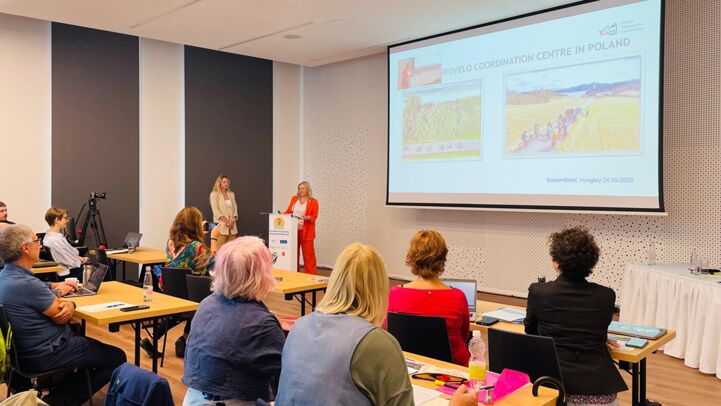
Poland was one of the largest European countries without a fully-fledged EuroVelo coordination body – until the EuroVelo General Meeting 2025! A few months ago, at Velo-city Gdansk, the Polish Tourism Organisation presented an application together with the Association of Polish Regions to establish a National EuroVelo Coordination Centre in Poland. The Vice President of the Polish Tourism Organisation Małgorzata Wilk-Grzywna, and Sylwia Skuta introduced the application to the EuroVelo General Meeting, which voted it positively.
This important milestone is backed by official agreements between the two consortium members and a long history of work with several Polish regions, and it includes ambitious plans for working on developing the rest of the 5,000 kilometres of EuroVelo routes in Poland, considering the excellent work done on EuroVelo 10 and 13, which are almost ready to cycle. In her presentation, Małgorzata Wilk-Grzywna said: "Poland has the ambition not to be only a crossing country but to become one of the top cycling tourism destinations."
EuroVelo in Hungary: a success story
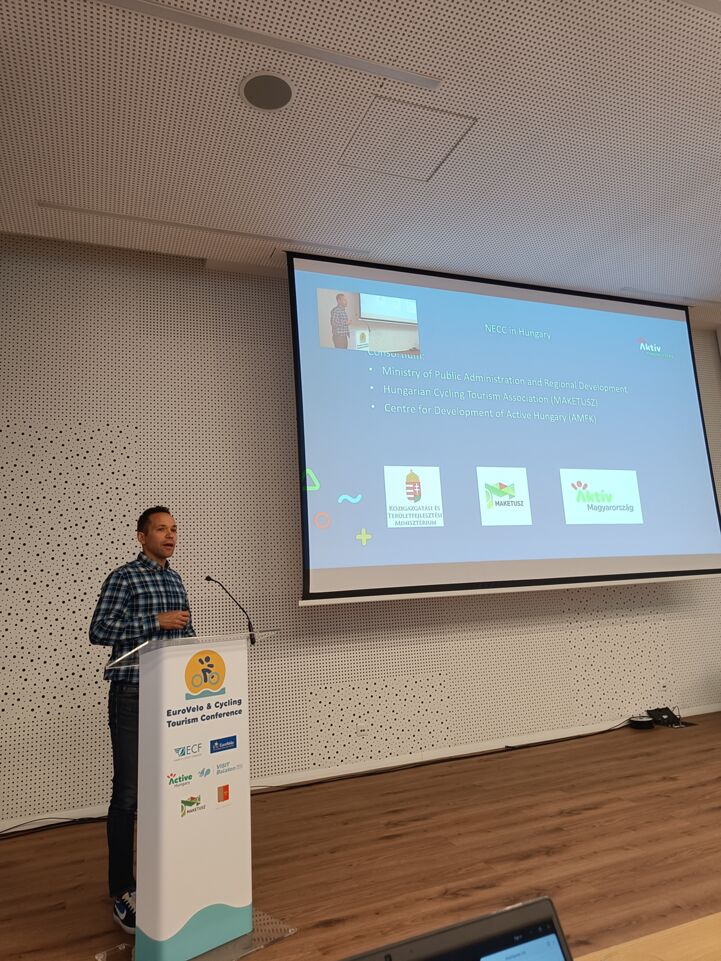
As every year, the NECC whose country hosts the EuroVelo General Meeting gets the chance to present their work in a bit more detail. Miklós Berencsi of the Active Hungary Development Center introduced the Hungarian consortium and activities.
The Hungarian NECC comprises the Active Hungary Development Center (AMFK), the Hungarian Cycling Tourism Association (MAKETUSZ), and the Department for Active Mobility at the Ministry of Public Administration and Regional Development. This partnership, established in 2018, coordinates the cycle route development, signage and maintenance.
Cycling tourism is a popular activity in Hungary, especially along the Danube and around Lake Balaton. The National EuroVelo Coordination Centre provides information through the national EuroVelo website, coordinates the local actors, supports their professionalisation with events and knowledge building, coordinates with public transport agencies and manages the cycling-friendly certification scheme. More information about the NECC work can be found in this article.
During the meeting, it was announced that 400,000 cyclists in a year were recorded on the EuroVelo 14 – Waters of Central Europe section close to Balatonfüred and that 100 km of EuroVelo 14 and EuroVelo 6 will be further developed by 2029.
EuroVelo governance changes
During the EuroVelo General Meeting, EuroVelo Council member elections took place once again. The first mandate of three EuroVelo Council members – Pinar Pinzuti, Spiros Papageorgiou, and Christian Weinberger – came to an end. Pinar Pinzuti and Christian Weinberger were re-elected for a second term: in their speeches, Christian reminded everyone that he saw EuroVelo right from the start, and of his extensive experience in funding and project management; Pinar, in turn, mentioned her international profile and cycling activism roots, how she managed to make cycling (and the communication and business of cycling) her job, and her future focus on accessibility, services and safety.
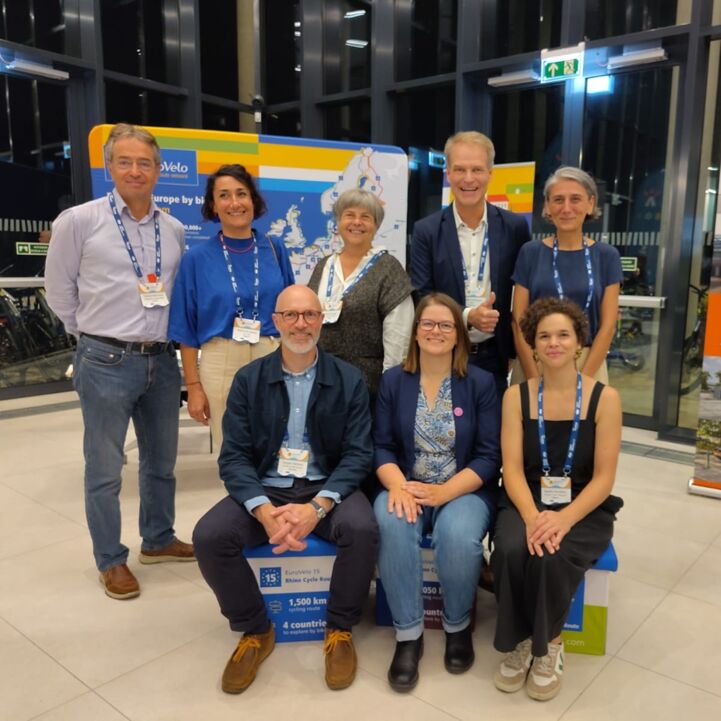
Wanda Nowotarska is the new face in the EuroVelo Council. A pioneer in EuroVelo route development in Poland, Wanda has worked to develop EuroVelo 10 and 13 in the Region of Western Pomerania for the past 15 years. In her speech, Wanda mentioned the role that the Bicycle Mobility Team within the Association of the Polish Regions played for the formation of the newly established Polish NECC, her commitment to help develop EuroVelo where it is not the case yet, and to represent women in cycling.
The EuroVelo Council includes a representative of the ECF Board, too. After many years of service in this role, ECF President Henk Swarttouw announced that he is stepping down and that the ECF Board has nominated Sílvia Casorrán Martos as its new representative in the EuroVelo Council. Sílvia Casorrán Martos works for RedBici, a network of Spanish cycling cities; she has been an ECF Board member since 2024 and is based in Barcelona.
Workshops
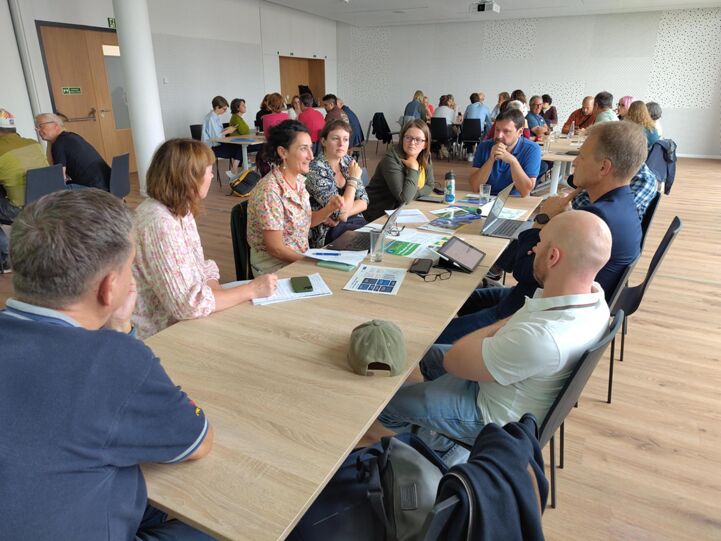
For the first time, the final part of the EuroVelo General Meeting consisted of workshops. As many National EuroVelo Coordination Centres have expressed, over the years, a wish to have more time to exchange and share experiences with other network members, the EuroVelo Management Team organised workshops.
Over almost two hours, delegates could talk about governance, monitoring, route development, services and collaboration with the private sector in lively discussion tables facilitated by EuroVelo Council members. Considering the different levels of development, there is never a one-size-fits-all approach to EuroVelo, but the debate ensured a better knowledge of challenges and achievements within the network and showed that there is room for even more extended discussions.
Tot ziens in Utrecht!
The EuroVelo General Meeting closed with the usual announcement and save the date for the following edition. The EVGM 2026 will take place in Utrecht, the Netherlands, on Wednesday 30 September, just before the opening of the EuroVelo & Cycling Tourism Conference. We already look forward to gathering again, this time in one of the cycling cities par excellence.
Article by Jessica Casagrande